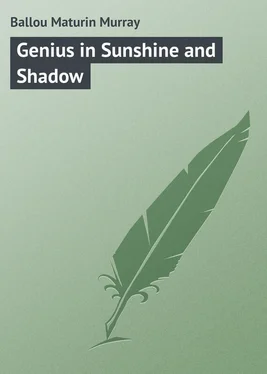Maturin Ballou - Genius in Sunshine and Shadow
Здесь есть возможность читать онлайн «Maturin Ballou - Genius in Sunshine and Shadow» — ознакомительный отрывок электронной книги совершенно бесплатно, а после прочтения отрывка купить полную версию. В некоторых случаях можно слушать аудио, скачать через торрент в формате fb2 и присутствует краткое содержание. Жанр: foreign_prose, foreign_humor, Анекдоты, на английском языке. Описание произведения, (предисловие) а так же отзывы посетителей доступны на портале библиотеки ЛибКат.
- Название:Genius in Sunshine and Shadow
- Автор:
- Жанр:
- Год:неизвестен
- ISBN:нет данных
- Рейтинг книги:4 / 5. Голосов: 1
-
Избранное:Добавить в избранное
- Отзывы:
-
Ваша оценка:
- 80
- 1
- 2
- 3
- 4
- 5
Genius in Sunshine and Shadow: краткое содержание, описание и аннотация
Предлагаем к чтению аннотацию, описание, краткое содержание или предисловие (зависит от того, что написал сам автор книги «Genius in Sunshine and Shadow»). Если вы не нашли необходимую информацию о книге — напишите в комментариях, мы постараемся отыскать её.
Genius in Sunshine and Shadow — читать онлайн ознакомительный отрывок
Ниже представлен текст книги, разбитый по страницам. Система сохранения места последней прочитанной страницы, позволяет с удобством читать онлайн бесплатно книгу «Genius in Sunshine and Shadow», без необходимости каждый раз заново искать на чём Вы остановились. Поставьте закладку, и сможете в любой момент перейти на страницу, на которой закончили чтение.
Интервал:
Закладка:
Ballou Maturin Murray
Genius in Sunshine and Shadow
PREFACE
The volume in hand might perhaps better have been entitled "Library Notes," as the pages are literally the gathered notes of the author's library-hours. The reader will kindly peruse these pages remembering that they assume only to be the gossip, as it were, of the author with himself, – notes which have grown to these proportions by casual accumulation in the course of other studies, and without consecutive purpose. That these notes thus made have been put into printed form, is owing to the publisher's chance knowledge and hearty approval of them. These few lines are by way, not of apology, – no sensible person ever made an apology, according to Mr. Emerson, – but of introduction; so that the reader may not fancy he is to encounter a labored essay upon the theme suggested by the title of the volume.
These pages may not be without a certain wholesome influence, if, fortunately, they shall incite others to analyze the character of genius as exhibited by the masters of art and literature. The facts alluded to, though familiar to many, are not so to all; wherefore the volume may indirectly promote the knowledge of both history and biography, at the same time leading the thoughtful reader to seek further and more ample information concerning those individuals who are here so briefly introduced.
M. M. B.CHAPTER I
The ever-flowing tide of time rapidly obliterates the footprints of those whom the world has delighted to honor. While it has caused heroic names, like their possessors, to lapse into oblivion, it has also shrouded many a historical page with the softened veil of distance, like ivy-grown towers, rendering what was once terrible now only picturesque. In glancing back through thousands of years, and permitting the mind to rest on the earliest recorded epochs, one is apt to forget how much human life then, in all its fundamental characteristics, was like our own daily experience. There never was a golden age; that is yet to come. The most assiduous antiquarian has only corroborated the fact that human nature is unchanged. Conventionalities, manners and customs, the fashions, may change, but human nature does not. As an example of the mutability of fame, we have only to ask ourselves what is actually known to-day of Homer, 1 1 Goldsmith makes his Chinese philosopher recount the name of Homer as the first poet and beggar among the ancients, – a blind man whose mouth was more frequently filled with verses than with bread.
Aristophanes, and their renowned contemporaries, or even of our more familiar Shakespeare? 2 2 Shakespeare's line expired in his daughter's only daughter. Several of the descendants of Shakespeare's sister Joan, bearing a strong family likeness to the great poet, were, so late as 1852, living in and about Stratford, chiefly in a state of indigence.
Of the existence of the first named we have evidence in his two great epics, the Iliad and the Odyssey; but, though deemed the most famous poet that ever lived, we do not even know his birthplace.
"Ten ancient towns contend for Homer dead,
Through which the living Homer begged his bread."
The cautious historian only tells us that he is supposed to have flourished about nine hundred years before the time of Christ; while there are also learned writers who contend that no such person as Homer 3 3 I have no doubt whatever that Homer is a mere concrete name for the rhapsodies of the Iliad. Of course there was a Homer, and twenty besides. I will engage to compile twelve books, with characters just as distinct and consistent as those of the Iliad, from the metrical ballads and other chronicles of England, about Arthur and the Knights of the Round Table. — Coleridge.
ever lived, and who attribute the two most famous poems of antiquity to various minstrels or ballad-mongers, who celebrated the "tale of Troy divine" at various periods, and whose songs and legends were fused into unity at the time of Pisistratus.
Over the personality of Aristophanes, 4 4 They must needs be men of lofty stature, whose shadows lengthen out to remote posterity. — Hazlitt.
the great comic poet of Greece, who is supposed to have flourished some five or six hundred years later than Homer, there rests the same cloud of obscurity, and he is clearly identified only by eleven authentic comedies which are still extant, though he is believed to have written fifty. Of Shakespeare, born some two thousand years later (1564), how little is actually known beyond the fact of his birthplace! Even the authorship of his plays, like that of Homer's poems, is a subject of dispute. Perhaps, however, this loss of individuality but adds to the influence of the poet's divine mission. The really great men of history, benefactors of their race, are those who still live in the undying thoughts which they have left behind them.
In this familiar gossip we propose to glance briefly at such names as may suggest themselves, without observing any strict system of classification. The theme is so fruitful, the pages of history so teem with portraits which stand forth in groups to attract the eye, that one hardly knows where to begin, what matter to exclude, what to adduce; and therefore, closing the elaborate records of the past, we will trust to momentary inspiration and the ready promptings of memory.
The first thought which strikes us in this connection is, that the origin of those whom the world has called great – men who have written their names indelibly upon the pages of history – is often of the humblest character. Such men have most frequently risen from the ranks. In fact, genius ignores all social barriers and springs forth wherever heaven has dropped the seed. The grandest characters known in art, literature, and the useful inventions have illustrated the axiom that "brave deeds are the ancestors of brave men;" and it would almost appear that an element of hardship is necessary to the effective development of true genius. Indeed, when we come to the highest achievements of the greatest minds, it seems that they were not limited by race, condition of life, or the circumstances of their age. "It is," says Emerson, "the nature of poetry to spring, like the rainbow daughter of Wonder, from the Invisible, to abolish the past and refuse all history." But this of course refers only to poetry in its loftiest and noblest conceptions and sentiments; and then only in passages of a great work.
Æsop, the fabulist, who flourished six hundred years before Christ, and whose fables are as familiar to us after the lapse of twenty-five hundred years as household words; Publius Syrus, 5 5 The Edinburgh "Review," once the most formidable of critical journals, took its motto from Publius Syrus: —
the eminent moralist, who lived in the time of Julius Cæsar, and whose wise axioms are to be found in every library; Terence, 6 6 The kindly human sympathy exhibited by Terence contributed largely to the popularity of his dramas. Whenever the often-quoted words, "I am a man; and I have an interest in everything that concerns humanity," were spoken upon the Roman stage, they were received with tumultuous applause by all classes.
the Carthaginian poet and dramatist; Epictetus, the stoic philosopher, – all were slaves in early life, 7 7 Crassus, a Roman triumvir, noted for his great wealth, who lived about a hundred years before the Christian Era, bought and sold slaves. These he educated, and taught the highest accomplishments of the day, sparing no labor or expense for the purpose. These educated slaves were then sold for large sums of money, so that any rich man could own his private poet and scholar. We are told by Plutarch that some of these slaves brought enormous prices into the treasury of Crassus.
but won freedom and lasting fame by force of their native genius. No man is nobler than another unless he is born with better abilities, a more amiable disposition, and a larger heart and brain. The field is open to all; for it is fixedness of purpose and perseverance that win the prizes of this world, – qualities that can be exercised by the most humble.
Интервал:
Закладка:
Похожие книги на «Genius in Sunshine and Shadow»
Представляем Вашему вниманию похожие книги на «Genius in Sunshine and Shadow» списком для выбора. Мы отобрали схожую по названию и смыслу литературу в надежде предоставить читателям больше вариантов отыскать новые, интересные, ещё непрочитанные произведения.
Обсуждение, отзывы о книге «Genius in Sunshine and Shadow» и просто собственные мнения читателей. Оставьте ваши комментарии, напишите, что Вы думаете о произведении, его смысле или главных героях. Укажите что конкретно понравилось, а что нет, и почему Вы так считаете.












